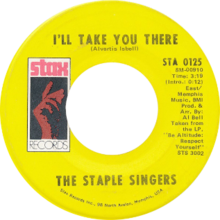Loading AI tools
1972 single by the Staple Singers From Wikipedia, the free encyclopedia
"I'll Take You There" is a song written by Al Bell (using his real name Alvertis Isbell), and originally performed by soul/gospel family band the Staple Singers. The Staple Singers version, produced by Bell, was released on Stax Records in February 1972, and spent a total of 15 weeks on the charts and reached #1 on the Billboard Hot 100. By December 1972, it had sold 2 million units[5] and is ranked as the 19th biggest American hit of 1972.[6] It remains one of the best-selling gospel songs of all time.
| "I'll Take You There" | ||||
|---|---|---|---|---|
 Belgian single release | ||||
| Single by the Staple Singers | ||||
| from the album Be Altitude: Respect Yourself | ||||
| B-side | "I'm Just Another Soldier" | |||
| Released | February 1972 | |||
| Genre | ||||
| Length | 4:43 3:16 (7" version) | |||
| Label | Stax | |||
| Songwriter(s) | Al Bell | |||
| Producer(s) | Al Bell | |||
| The Staple Singers singles chronology | ||||
| ||||
| Alternative release | ||||
 Side A of US single release | ||||
The song was also a significant chart hit in two later cover versions. A 1991 cover version by BeBe & CeCe Winans, with Mavis Staples featured as a guest artist, made it to #1 on the R&B chart, and also reached #90 on the Hot 100.[7] In 1994, the British band General Public released a cover of "I'll Take You There" which peaked at #22 on the Hot 100.[8] Rap trio Salt-N-Pepa sampled "I'll Take You There" in their 1991 hit "Let's Talk About Sex". In 1997, the song was used by automobile manufacturer Chevrolet in its commercials for the revival of their Chevy Malibu.
Included on the group's 1972 album Be Altitude: Respect Yourself, "I'll Take You There" features lead singer Mavis Staples inviting her listeners to seek Heaven. The song is almost completely a call-and-response chorus, with the introduction and bassline being lifted—uncredited—from "The Liquidator", a 1969 reggae hit written by Harry Johnson and performed by the Harry J Allstars. In fact, the entire song, written in the key of C, contains but two chords, C and F. A large portion of the song is set aside for Mavis' sisters Cleotha and Yvonne and their father "Pops" to seemingly perform solos on their respective instruments. In actuality, these solos (and all music in the song) were recorded by the Muscle Shoals Rhythm Section. When Mavis Staples says "Daddy, now, Daddy, Daddy" (referring to "Pop's" guitar solo), it is actually Eddie Hinton who performs the solo on the record. Muscle Shoals Rhythm Section bass player David Hood performs the song's bassline. Terry Manning added harmonica and lead electric guitar. Roger Hawkins played drums, Barry Beckett was on Wurlitzer electronic piano, and Jimmy Johnson and Raymond Banks contributed guitar parts. The horn and string parts were arranged by Detroit arranger Johnny Allen. The horns and strings were recorded at Artie Fields Recording Studios in Detroit Michigan.
Quite a few Staple Singers songs reference civil rights and social conditions. Many people interpret this song as describing an imagined world in which the civil rights movement has succeeded: "No more smilin' faces/lyin' to the races."
Rolling Stone editor David Fricke described this song as the "epitome of the Muscle Shoals Sound". It was recorded in Sheffield, AL at the famous Muscle Shoals Sound Studios, and overdubbed and mixed at Ardent Studios in Memphis by Engineer Terry Manning.
Bolstered by a "feel-good" vibe, "I'll Take You There" peaked at #1 on the Billboard R&B Singles chart for four weeks May 1972. In June, "I'll Take You There" reached the top of the Billboard Hot 100 for one week.[9] Billboard ranked it as the #19 song for 1972.[10] The song, ranked #276 on the Rolling Stone list of the 500 Greatest Songs of All Time[11] and inducted into the Grammy Hall of Fame in 1999, remains the most successful and recognizable single of the Staples' half-century-long career.
Partial credits from Richard Buskin and Terry Manning.[12]
In 1991, the song returned to number-one on the US R&B chart when it was covered by BeBe & CeCe Winans, with Mavis Staples featured as a guest artist on the track.[23] The single also peaked at number 90 on the Hot 100[24][25] and number 11 on the Holland National Airplay chart.[26]
In 1994, the British band General Public released a cover of "I'll Take You There" featured in the film Threesome. It peaked at #22 on the weekly Billboard Hot 100 chart and #95 on its year-end chart.[27] It also peaked at #38 on the year-end chart of Canadian RPM Top Singles.[28] This version features an added toasted verse specific to this rendition.
In 2005, Sammy Hagar and The Waboritas released a cover titled "Let Me Take You There" as the first single from their 2006 album Livin' It Up!
Seamless Wikipedia browsing. On steroids.
Every time you click a link to Wikipedia, Wiktionary or Wikiquote in your browser's search results, it will show the modern Wikiwand interface.
Wikiwand extension is a five stars, simple, with minimum permission required to keep your browsing private, safe and transparent.